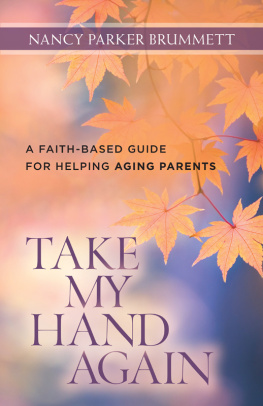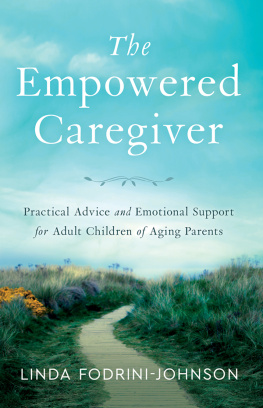Praise for While Theyre Still Here
Trish Williams, as a responsible and dutiful daughter, weaves an engaging story of the struggles and painful moments in caring for her aging parents. But she doesnt stop there. With humor and insight, she gives the reader a clear and compassionate view of their lives, including those sweet moments that make them more lovable in spite of themselves. She also shares her difficulties and frustrations in her role as the responsible one. Of course, the irresponsible child would never have written the book!
R OSALIE T HOMAS , RN, PhD
The emotional roller coaster of caring for an aging parent is not an easy ride. Baby boomersthe population riding that train right nowoften find themselves trying to balance respect for a parents intelligence and independence with providing for his or her safety and security. It is a juggling act of epic proportions. In While Theyre Still Here, that juggling act is an emotional tribute to self-sacrifice and a daughters unfailing love for her parents. To the authors credit, it also glimpses the depth of understanding of her family and self that Williams achieved during this formidable experience. This book is written with honesty, humility, and love, and will remind anyone involved in caring for an elderly parent that you are not alone in your labor of love.
S ANDRA B ULLOCK S MITH , award-winning author of Trading Places: Becoming My Mothers Mother
A refreshingly candid, poignant memoir that lays bare the physical and emotional costs of care, While Theyre Still Here powerfully demonstrates the lengths we go to ensure the health and safety of our aging parents. Williams writing is stark and lucid, her well-crafted anecdotes filled with compassion even as her life is upended and her caregiving duties mount. Her book reminds us of the ability we all have to redefine our lives and our relationship with our parentsand to savor the time we have left with them.
J ANA P ANARITES , author of Scattered: My Year As An Accidental Caregiver
In her new memoir, While Theyre Still Here, author Patricia Williams writes about the ultimate role reversal. Her role as a loving daughter is slowly upended as she becomes a lifeline and caregiver for her aging parents as they try to negotiate the daily challenges that overturn their lives and hers. The role of caregiver is one many of us must face. Williams candidly shares the intimate and rewarding moments along with the fears and unexpected burdens that go along with this complex relationship. The reader will empathize and learn from her experience and will take away familiar themes they can learn from and that will stay with them.
I RIS W AICHLER , MSW, LCSW, patient advocate and award-winning author of Role Reversal: How to Take Care of Yourself and Your Aging Parents
While Theyre Still Here

Copyright 2017 by Patricia Williams
All rights reserved. No part of this publication may be reproduced, distributed, or transmitted in any form or by any means, including photocopying, recording, digital scanning, or other electronic or mechanical methods, without the prior written permission of the publisher, except in the case of brief quotations embodied in critical reviews and certain other noncommercial uses permitted by copyright law. For permission requests, please address She Writes Press.
Published 2017
Printed in the United States of America
Print ISBN: 978-1-63152-240-6
E-ISBN: 978-1-63152-241-3
Library of Congress Control Number: 2017943955
For information, address:
She Writes Press
1563 Solano Ave #546
Berkeley, CA 94707
Cover design Julie Metz, Ltd./metzdesign.com
Interior design by Tabitha Lahr
She Writes Press is a division of SparkPoint Studio, LLC.
Names and identifying characteristics have been changed to protect the privacy of certain individuals.
Dedication
To my mother, and all the neighbors, friends, relatives, and caregivers who have graced her life, especially my father and our two beloved redheadsmy grandfather and my brother.
Chapter 1
T he driver hadnt required much more than a grunt or a single-word contribution from me to maintain his prattle for an hour.
What time you leave home this morning? he asked, his battered toothpick waving like a bandleaders baton in time with his words.
Four, I answered.
Long day. Almost there now. Youre so lucky you can do this. I wish I coulda had the chance.
Um, I answered uncertainly.
Once theyre gone, its forever too late. He coughed out the last word, and I looked to see if I should begin first aid for a swallowed toothpick. From the way he was shaking his head, I decided he was only choking on a sliver of regret. I had no remedy for that.
Yeah was all I could muster, but I knew his taxicab wisdom held truth. Id heard this same comment several times in the last few days from friends and relatives.
He yanked out the toothpick after it tangled in his scraggly mustache, then fondled a pack of cigarettes under the dash. That explained the reek of pine air freshener from dangling cardboard trees.
Here we are, he announced, as if I didnt know. Do you want me to wait until you get in the house? An unlit cigarette swayed from his lips now.
No, you go on ahead. Thanks. I didnt want to hurry my fate just so he could smoke.
His airport van sputtered away, leaving me alone in the dark driveway with only my suitcases and my dread. I stood there, unable to move, my new job description stiffening me like a nurses starched white uniform. The rain-soaked concrete was still steaming at eleven oclock at night, with that indelibly acrid stench of simmering road grime. I was starting to sweat and steam, too, but I rolled my sleeves down against the mosquitoes reconnoitering for the only available flesh.
I had kissed my partner and my dogs good-bye in the opposite corner of the country before breakfast, zigzagged and layovered in an exhausting and inefficient short-notice flight plan to arrive in Englewood, Florida, but I was reluctant to undertake the last thirty feet to my destination.
Bad travel plans symbolized the end of my well-ordered life. When I had signed on for this job two weeks before, I had known I was relinquishing my nutritionally balanced, organic meals, eight hours of sleep, short to-do lists with each task crossed off at the end of the day, and regular exercise. My career as a dental hygienist had abruptly screeched to an end after a shoulder injury, so I couldnt use work as an excuse to turn down this assignment.
Straightening my invisible caregivers uniform, I zipped up my courage, tucked in my compassion, and pasted on my smile. I could do this. I had to do this. I had trained my whole life to do this. I marched up the driveway to the front porch of this familiar stucco ranch-style house, crunching through oily seeds and dried leaves from the witch hazel tree. I swatted its prickly branches out of my face, wondering if I should prune it or cut it down, already initiating a new to-do list.
When I tiptoed into the house, the boiled-cabbage fumes of old age foreshadowed my future. No chicken soup simmering on the stove, no lingering cinnamon from a fresh apple pie to welcome me back. My mother was sick in bed, and my father was asleep, gasping and rattling in his threadbare recliner in the living room. Where was his apnea equipment? I pulled a notebook from my back pocket and jotted down witch hazel tree and snoring.
The memorabilia of my parents lives, our lives, burgeoned wall to wall: inlaid end tables my dads father built while out on strike from the railroad; pen-and-ink drawings by my mothers artistic sister; glassware from a great-aunts estate auction forty years before; and afghans crocheted by each of my grandmothers. My mothers only concession to new decor when they had retired here from Maryland fourteen years ago had been to leave behind her early-American couch and chair and buy a pastel floral set more in keeping with Floridas ambience. She still lamented that choice, as if shed deserted an old friend.










